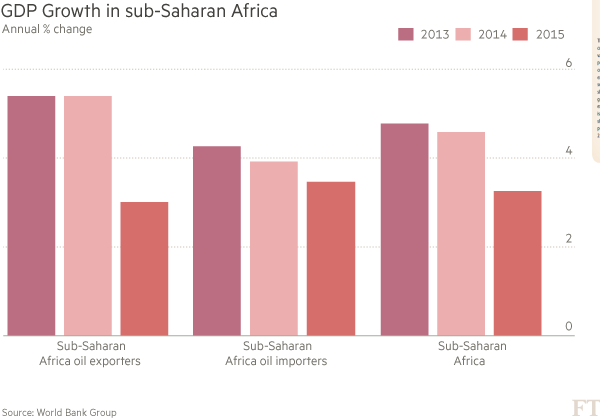Republicans implode, killer robots and Goldman Sachs for the masses
Simply sign up to the Global Economy myFT Digest -- delivered directly to your inbox.
Sign up to receive FirstFT by email here
Donald Trump’s rivals for the Republican party’s presidential nomination have announced they will co-ordinate strategies against him. Ted Cruz will cut campaigning in the Oregon and New Mexico primaries to help Mr Kasich, while the latter will give Mr Cruz a “clear path” in Indiana. Mr Trump said his rivals were “totally desperate” and “mathematically dead”.
Mr Cruz has a clear early lead in the Republican race for unbound delegates who can vote their personal preference on the first ballot at the Cleveland convention, according to a TIME survey, presenting an obstacle for Mr Trump if he falls short of the 1,237 bound delegates needed to clinch the nomination. Mr Trump has accused Mr Cruz of “bribing” delegates to come to his side.

What do we want? Donald Trump asks his crowds. “A wall!” they reply. Who is going to pay for it? “Mexico!” “Now, here is a question Mr Trump never asks: who will vote in record numbers against me? ‘Hispanics!’ should be the response.” Republicans are likely to pay the price for Mr Trump’s anti-Hispanic rhetoric for a long time, writes the FT’s Ed Luce. (FT, Time, CNN)
In the news
Bangladesh hackers compromised Swift software The attackers who stole $81m from the Bangladesh central bank probably hacked into software from the Swift financial platform that is at the heart of the global financial system, said security researchers at British defence contractor BAE Systems. Swift, a co-operative owned by 3,000 financial institutions, confirmed to Reuters that it was aware of malware targeting its client software and that is would release a software update to thwart the malware. (Reuters)
Mexican students’ night of terror Despite apparent stonewalling by the Mexican government in recent months, two reports by international investigators have provided the fullest accounting of the events surrounding the disappearance of 43 students in 2014. (NYT)

Germany lax in enforcing air safety rules Germany is one of Europe’s worst enforcers of air safety rules, trailing only Greece in failing to comply with basic requirements to protect passengers, according to a confidential report by Europe’s top aviation watchdog. German regulators failed to uphold or enforce European Union air safety rules in more than 15 sensitive areas, according to the report, dated March 7 and reviewed by The Wall Street Journal. (WSJ)
China debt rises to 237% of GDP The record first quarter figure, far above emerging market counterparts, raises the risk of a financial crisis or a prolonged slowdown in growth, economists warn. Beijing has turned to massive lending to boost economic growth, bringing total net debt to Rmb163tn ($25tn) at the end of March, according to FT calculations. More worrying is the speed at which it has accumulated this — Chinese debt was only 148 per cent of GDP at the end of 2007. (FT)
Goldman Sachs opens to the masses For nearly 150 years, the Wall Street titan has been the go-to bank for the rich and powerful. But now it is offering online savings accounts for as little as $1 on deposit. (FT)
China to toughen vehicle emissions standards Beijing is set to introduce stricter environmental standards for automobiles in a bid to cut pollutants in vehicle exhaust by an average of 50 per cent a year. (NAR)
It’s a big day for
Muhammad bin Salman, Saudi Arabia’s deputy crown prince, is to announce his “Saudi Vision 2030”, which is expected to set out radical policy goals to shift the kingdom away from oil dependency. His reform drive “may face resentment from a population accustomed to government largesse and power circles stunned by the rapid rise of the 30-year-old prince, political analysts say”. (Reuters, Bloomberg)
US role in Syria Barack Obama has announced the addition of up to 250 Special Operations troops to the American advisory force in Syria, the administration’s latest move seeking to intensify pressure on the Islamic State. (WaPo)
Food for thought
Killer robots The moral case against killer robots is clear enough in a philosophy seminar. The trouble is the closer you look at their likely use in the fog of war the harder it is to discern the moral boundaries, writes John Thornhill. Robots (with limited autonomy) are already deployed on the battlefield in areas such as bomb disposal, mine clearance and antimissile systems. Their use is set to expand dramatically. (FT)
Out of Africa Optimism surrounding the continent has evaporated with the collapse in commodity prices. What causes for hope for the continent’s economic future are left? (FT)

The fall of Dennis Hastert The former US House Speaker rose to the highest levels of American politics without any of the sordid allegations about his past coming to light. Convicted of paying hush money to cover up his raping of children, he is about to be sentenced, and his political friends have closed ranks around him. (WaPo, Boing Boing)
I, imposter Feeling alone and inadequate at work? You’re suffering from “imposter syndrome” — a common state of mind, but one with benefits. (BBC)
Video of the day
China’s debt problem explained The FT’s Gabriel Wildau looks at how and why China’s debt levels have risen so high and so quickly.
Comments